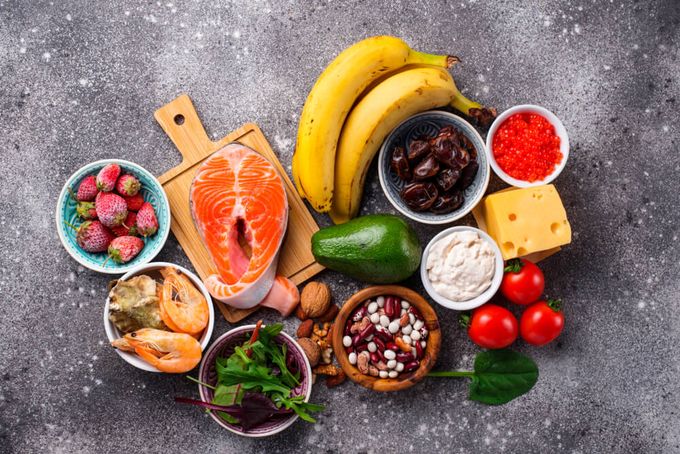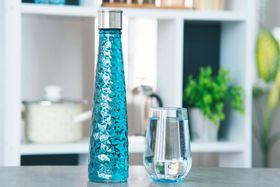How to Get Electrolytes While Fasting: Essential Tips
Fasting: the secret to unlocking superhuman levels of energy... if you don't crash from electrolyte imbalance first
Published August 9, 2024.

As an Olympic Athlete, I've experienced firsthand how vital electrolytes are when fasting, especially if you're pushing your limits physically. [1] Their levels can plummet quickly, causing fatigue and muscle cramps.
Finding proper electrolyte sources while fasting is tricky. Many commercially available drinks have sugars or artificial sweeteners, which can break your fast. That's where our guide comes in; let's discuss maintaining minerals through diet and high-quality supplements.
» Get essential electrolytes while fasting with mineral drops
What Are Electrolytes?
Electrolytes are the tiny traffic cops keeping everything flowing smoothly in your body. These minerals—like sodium, potassium, and calcium—dissolve inside your bloodstream, carrying an electric charge.
When your nerves send signals to the muscles, they carry those messages to make them contract and relax. Electrolytes also help regulate fluid balance, keeping you from getting too dehydrated or bloated.
» Learn the best ways to add electrolytes to your water
Does Drinking Electrolytes Break a Fast?
Drinking electrolyte drinks usually won't mess up your fast. Most of them are low in calories, so they won't make your body start using food instead of fat.
But always check the label because some drinks have added sugar or other stuff that could ruin your fast. And if you're only drinking water during your fast, even electrolyte drinks might not be okay.
» Believe it or not, not all water is equal. Find the healthiest water to drink
Importance of Electrolytes During Fasting
Electrolyte imbalance can seriously disrupt your mental and physical well-being. Keeping these minerals in check is essential during fasting to avoid dehydration, muscle weakness, headaches, and arrhythmias.
During a fast, your body undergoes several changes that can lead to electrolyte imbalances:
- Increased Water Loss: Fasting can cause more urination and sweating, depleting electrolytes.
- Sodium Loss: The body naturally sheds sodium during a fast, which can disrupt the balance.
- Keto Flu Symptoms: Some people experience fatigue, headaches, and muscle cramps (keto flu) which can be lessened by sufficient electrolyte intake.
Supplementing with electrolytes during a fast offers several benefits:
- Prevents dehydration by helping maintain proper fluid balance.
- Reduces muscle cramps as electrolytes are essential for muscle function.
- Alleviates keto flu symptoms by potentially mitigating fatigue, headaches, and other discomforts.
- Improves energy levels by contributing to sustained energy during the fast.
It's important to listen to your body and adjust your electrolyte intake accordingly. Excessive consumption can also lead to imbalances.
» Find out how to rehydrate after vomiting
Electrolyte Intake During Fasting: A Personalized Approach
Determining the exact amount of electrolytes needed during a fast is challenging as it varies based on individual factors like:
- Length of the Fast: Shorter fasts might require minimal supplementation, while longer fasts may necessitate increased intake.
- Individual Metabolism: How quickly your body processes and excretes electrolytes.
- Physical Activity: Exercise can increase electrolyte loss. [2]
- Climate: Hot and humid conditions can lead to greater electrolyte depletion. [3]
- Overall Health: Pre-existing conditions might influence electrolyte requirements.
The following are some general guidelines for maintaining electrolytes while fasting:
- Short-Term Fasts (12-24 hours): You might not need additional electrolytes beyond what you consume through regular food intake.
- Longer Fasts (24-48 hours): Consider supplementing with electrolytes, especially if you experience symptoms like fatigue, headache, or muscle cramps.
- Extended Fasts (multiple days): Consulting with a healthcare professional is advisable to determine appropriate electrolyte levels.
Here are some key electrolytes to focus on:
- Sodium: Crucial for maintaining fluid balance. [4]
- Potassium: Essential for nerve and muscle function. [5]
- Magnesium: Supports muscle and nerve function, and energy production.
» Check out the harmful effects of drinking hard water
Additional Tips
- Listen to your body. If you're feeling symptoms like muscle cramps, fatigue, or dizziness, break the fast and replenish your electrolytes.
- Be consistent with your electrolyte sources. Include broths, mineral-rich foods, or supplements throughout fasting, especially if it's longer than 24 hours.
- Keep your fasting and training goals in mind. When pushing your limits, you may need to use more electrolytes than someone less active.
- Seek professional guidance. If you need more clarification about your electrolyte needs, a doctor or registered dietitian can help you create a personalized plan.
» Check out the difference between electrolytes and minerals
Food Sources of Electrolytes
Magnesium-rich foods like nuts and seeds are excellent natural sources of electrolytes. So are the ones rich in potassium, such as:
- Avocado
- Bananas
- Spinach
- Yogurt
- Oranges
- Lentils
- Himalayan pink salt
- Bone broth
You can also make an electrolyte drink at home. All you need is the following:
- Water
- Himalayan pink salt (or sea salt)
- Potassium chloride (No Salt is a common brand)
- Lemon or lime juice (optional)
And here's how to make it:
- Fill a glass or bottle with water.
- Add a pinch of Himalayan pink salt and potassium chloride.
- Squeeze in half a lemon or lime for added flavor and potassium.
Note: Start with small amounts and gradually increase to your tolerance. Too much salt can be unpleasant.
» Feeling Tired? Find out how electrolytes boost your energy levels
Best Electrolyte Supplement to Take While Fasting
Hydration helps me manage electrolytes during intermittent fasting; I pack in broths, salty snacks, or supplements before my eating window.
For longer fasts, sipping drinks with Mayu Minerals Electrolytes Drops throughout the day safeguard against imbalances. Careful management has helped me healthily push past my limits.
» Unleash your power with caffeine-free energy drinks
Achieve Peak Performance While Fasting
As an essential component of overall health, keep electrolyte-rich foods on hand pre- and post-fasting. Think avocado, leafy greens, nuts, and seeds. Also, consult a nutritionist about recommended supplements and avoid exceeding the dosages.
By prioritizing electrolyte balance, you can enhance your fasting experience, support optimal bodily functions, and contribute to your overall well-being.
» Support your fast with essential minerals
References:
- I. Shrimanker and S. Bhattarai, “Electrolytes,” StatPearls - NCBI Bookshelf, Jul. 24, 2023. Available: https://www.ncbi.nlm.nih.gov/books/NBK541123/
- R. J. Maughan, “Fluid and electrolyte loss and replacement in exercise*,” Journal of Sports Sciences, vol. 9, no. sup1, pp. 117–142, Jun. 1991, doi: 10.1080/02640419108729870. Available: https://pubmed.ncbi.nlm.nih.gov/1895359/
- K. Mantzios et al., “Effects of weather parameters on endurance running performance: Discipline-specific analysis of 1258 races,” Medicine & Science in Sports & Exercise, vol. 54, no. 1, pp. 153–161, Oct. 2021, doi: 10.1249/mss.0000000000002769. Available: https://pubmed.ncbi.nlm.nih.gov/34652333/
- National Library of Medicine, “Fluid and electrolyte balance.” Available: https://medlineplus.gov/fluidandelectrolytebalance.html
- “Office of Dietary Supplements - Potassium.” Available: https://ods.od.nih.gov/factsheets/Potassium-HealthProfessional/
FAQs
Does lemon water break a fast?
Plain lemon water typically doesn't break a fast due to its negligible calorie content. However, added sugars or sweeteners can disrupt your fast. If you are unsure about your specific fasting goals, consult a healthcare professional.
Can you drink bone broth on alternate day fasting?
Bone broth will break a fast on alternate day fasting. It contains calories from protein and fat, which interrupts the fasting period. However, it can be beneficial during your eating window due to its nutrient content.
Does stevia break a fast?
No, stevia does not break a fast. It's a zero-calorie sweetener that doesn't affect insulin levels or blood sugar.
Can you drink tea while fasting?
Yes, you can drink unsweetened tea while fasting. Black, green, white, and herbal teas are generally considered fasting-friendly. Avoid adding milk, sugar, or other sweeteners, as these can break your fast.
Does diet soda break a fast?
Diet soda technically won't break a fast as it contains no calories. But, artificial sweeteners can potentially interfere with the body's fasting response and might not be ideal for everyone. Some people prefer to avoid them altogether during fasting.
Disclaimer: The information published by Mayu Water is not a substitute for the expert knowledge, advice, and recommendations of trained professionals. We strongly recommend consulting with industry experts and primary or scientific sources before making any health, research-related, or other important decisions.





